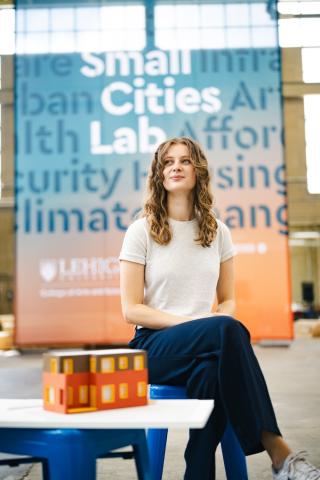Exploring the Numbers Driving Alley Houses
Graduate student Heidi Kline assesses government policies as part of an affordable housing project
Affordable housing is difficult to find in the Lehigh Valley. Between a high demand and low inventory for inexpensive housing, people are left with limited options. Graduate research assistant Heidi Kline has spent the summer studying the development of Alley Houses in Bethlehem with the vision of creating case studies that can assist small cities across the country experiencing the same challenges.
Alley Houses are a housing type native to Bethlehem and a precursor to contemporary accessory dwelling units, or ADU, a secondary housing unit on a single-family residential lot. An ADU can be fully detached from a primary residence or even in a garage. Working with the Alley House Program – a project within the College of Arts and Sciences’ Small Cities Lab – Kline collaborated with undergraduate architecture major Margaret Mancusi-Ungaro to create a list of about 380 small cities that have ADU ordinances. From that list, she is examining different metrics of a city, such as population and age of housing. Kline hopes to come up with about 10 case studies based on her analysis.
“We'll be calling the cities and asking them about the history of their ADU ordinance, how it came about, and how it's going,” said Kline, who is part of the environmental policy program. “Basically, we’re trying to come up with some best practices for implementing this kind of ordinance in our own context and to provide a knowledge base that other small cities can benefit from.”
This focus fits within the Small Cities Lab’s mission, which was founded to address urban challenges in small cities across the country through community-facing, action-oriented research projects. The Lab is the first of its kind in the nation, and will help bridge a critical research gap by focusing on cities with under 500,000 people.
The Alley House Program is made possible through an innovative university-community partnership between the Small Cities Lab, Community Action Lehigh Valley, Community Action Development Bethlehem, The City of Bethlehem, and New Bethany. Led by Assistant Professor of Architecture, Wes Hiatt, and Professor of Practice in Political Science, Karen Beck Pooley, the project proposes the Alley House as a hyper-local solution to the scarcity of affordable housing in Bethlehem and the Lehigh Valley Kline and other members of the team have paired this work with taking inventory of the existing alley house stock in Bethlehem. The team created a survey of all the city’s alleys, then parcel by parcel, walked the streets over a four-day period in June, documenting more than 900 existing Alley Houses throughout the city
“We wanted to know, Is there an alley house here? Yes, or no?,” Kline said. “If not, what is the main use of this parcel that's facing the alley?" And so right now, we're working on putting some of that data on the map, and then coming to some meaningful conclusions about just what our alleys look like right now.”
"That was one of the things that interested me about this program, the opportunity to see behind the scenes what goes into updating a city ordinance. There are also a lot of environmental advantages to Alley Houses, because they make efficient use of land that's already developed."
The Alley House Program is funded by two pivotal grants, a $196,722 United States Department of Housing and Urban Development (HUD) Grant and an $850,000 Congressional appropriation through the Transportation, Housing, and Urban Development (THUD) bill with the support of Senator Bob Casey and Representative Susan Wild. This federal appropriation was the first grant of its kind in Lehigh University history. In June, the Program was awarded $500,000 through the Pennsylvania Housing Finance Agency's PHARE program, which supports affordable housing related projects across the state.
ADUs come in a variety of forms, such as detached new construction, garage conversion, bump-out, and basement conversions. As an independent residence, an ADU has its own kitchen, bathroom and living room, and bedrooms that are separate from the primary home on the lot. Alley Houses have caught the attention of city officials, since they provide a path to increasing housing supply that is in-keeping with the existing fabric of Bethlehem neighborhoods.
“I believe that with this pilot project we're doing, the people will live in the primary house on the property until they retire, and then they'll move into the Alley House,” Kline said. “So, it's a mix. I've heard of them being rentals. I've heard of them being in-law suites or places where family members can live – these units can be either rental or non-rental for many different types of occupants.”

The Alley House work ties in with Kline’s academic path. As an environmental policy student, she is pursuing a concentration in urban environmental policy and planning.
“That was one of the things that interested me about this program, the opportunity to see behind the scenes what goes into updating a city ordinance,” she said. “There are also a lot of environmental advantages to Alley Houses, because they make efficient use of land that's already developed. Compared to single family homes in suburban environments, they use a lot less energy because they're smaller. ADUs can help gently increase housing density, which can reduce the amount of driving people have to do and reduce greenhouse gas emissions. And, when you have an affordable housing crisis, as we do, people are a lot more vulnerable to climate change events like flooding and heat waves. I'm really interested in climate change resilience, and how strong communities can help people be more resilient to climate change.”
Scheduled to graduate in May 2025, Kline is considering a broad range of career options. “I think municipal work sounds really interesting, seeing the challenges that cities are facing, and having an interest in the different ways they can address that, whether housing,transportation, or environmental challenges. But I'm open to a lot of different things. I have friends in this program who are interested more in private sector work, which could also be interesting. Environmental consulting, that type of thing. We'll see. I'm open to a lot of different things.”

